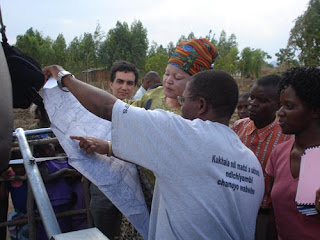By Elias Banda
The Peter Wallenberg Water, Sanitation and Hygiene (WASH) Project has been launched in Mulanje with support from Water for All, courtesy of Peter Wellenburg. The event marking the taking off of the water project took place on Thursday, 1st October 2015 at the District Water Office, where ADRA Malawi staff made a presentation on the project scope to the District Executive Committee (DEC). DEC members include all governmental and non-governmental agencies in the district, including the Water Department.
While making a presentation, Enhanced Livelihood through Gender Empowerment (ELGE) Project Manager, Andiyesa Mhango said the PWW project goal would ensure that communities in the Traditional Authority Chikumbu particularly in the targeted village communities have improved health and socio-economic wellbeing through access to safe water, sanitation and the adoption of positive hygiene behavior by the year 2018.
 |
| The PWW team in Mulanje |
To achieve this broader picture, Mhango told DEC that the project would increase community access to sustainable, potable water and environmental sanitation; reduce the prevalence of WASH –related diseases through hygiene promotion and environmental sanitation practices; increased awareness on hygiene and sanitation best practices including construction of sanitary structures in targeted public places.
Reflecting on the presentation, and while speaking on behalf the District Commissioner was Mulanje District Water Development Officer, Edson Mchilikizo commended ADRA Malawi and the donor partners for the timely project and pledged to support the water initiative at any stage of its implementation. He called on all relevant stakeholders in the district to rally behind the project in order to achieve positive results.
ADRA Malawi made the initial presentation to DEC members on the prospective water project in July 2015 when the organization expressed interest to drill and rehabilitate water points in the affected areas in Traditional Authority Chikumbu in the district. Mulanje DEC nodded to the proposal and gave ADRA Malawi the leeway to proceed with the project.
 |
| DEC members listening to the presentation |
According to PWW Project Coordinator MacDonald Kanjewe, the three-year project would target 19 of the 22 village communities where the ELGE project is being implemented. Among other achievements, the project intends to reduce the time women spend when fetching water. An assessment conducted earlier revealed that many water points in the targeted area had more than 250 people each, against the recommended 250 people per borehole.
lets.
Perter Wellenberg WASH Project Background












 Miriam (27) in the picture expresses her joy and how the availability of safe water from a protected shallow well has changed her life. By reducing the distance and time taken to fetch water, women are able to do more household chores and are able to participate in other development activities including time to prepare nutritious food and feed their children
Miriam (27) in the picture expresses her joy and how the availability of safe water from a protected shallow well has changed her life. By reducing the distance and time taken to fetch water, women are able to do more household chores and are able to participate in other development activities including time to prepare nutritious food and feed their children
 Picture above: Village Headwoman Waruma and beneficiaries appreciating safe potable water..
Picture above: Village Headwoman Waruma and beneficiaries appreciating safe potable water.. Picture above: Village Headman Ng’oma and his wife in their home vegetable garden.
Picture above: Village Headman Ng’oma and his wife in their home vegetable garden.







